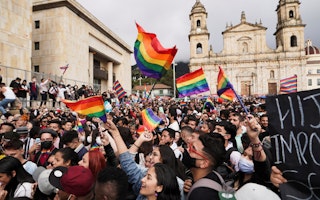In Georgia, a Brave Step Toward LGBT Rights
By Katya Kumkova
This summer, accounts of lesbian, gay, bisexual, and transgender asylum seekers fleeing Russia’s repressive law on “homosexual propaganda” peppered reports in the English-language media. Meanwhile, a different former Soviet country, Georgia, settled into a period of transition that, rights activists hope, will eliminate LGBT discrimination.
The transition began last spring after the country’s parliament passed a new antidiscrimination law that includes protections for gender identity and sexual orientation. While some have criticized the law for not going far enough in enforcing its own mandate, many have hailed it as a brave step toward ensuring LGBT rights in a region beset by state and religious homophobia.
“I think it’s a victory for the Georgian government over the Georgian church, the most trusted institution in the country,” said Vano Chkhikvadze, the EU integration field manager at the Open Society Georgia Foundation, who worked with the government to organize a coalition of civil society organizations that helped shape the law.
“Now it’s up to the Georgian government,” he added, noting that implementation will not be an easy task.
The new discrimination ban outlines 25 categories, from race and creed to disability and social status, that are entitled to protections. But it is the gender expression and sexual orientation provisions that are considered the most progressive—and the most controversial.
Like other countries in the former Soviet Union, Georgia has struggled to end discrimination against the LGBT community. Those who are LGBT—and even those who are perceived to be—are often refused service by businesses and hospitals, bullied in school, and harassed by the police. Meanwhile the Georgian Orthodox Church, a sister denomination to its Russian counterpart, has attacked support for LGBT equality as the “propaganda of sin.”
Initially, progress on LGBT rights appeared to be unlikely in Georgia. According to a 2013 report by Identoba, an Open Society grantee, 88 percent of respondents believed that homosexuality can “never be justified.” But the country’s desire to continue its budding cooperation with Europe meant that it had to confront its prejudices.
“Two years ago, most human rights organizations would not even mention this issue,” said Irakli Vacharadze, the head of Identoba.
Compiled with input from more than 30 civil society organizations, the new law was designed to fulfill European Union requirements that would allow Georgians to travel to Europe short-term without a visa.
Vacharadze and others have criticized the government for passing the legislation without a devoted enforcement office: cases will go to the Ombudsman for Human Rights, which currently lacks capacity. Together with the coalition, the local Open Society foundation is advocating for specific funds, including from the EU, that will lead to implementation such as compliance trainings in schools, hospitals, private business, and the judicial system. Meanwhile, in the next 10 months Vacharadze and others hope to prepare a set of complaints that will be sent to the Ombudsman that will be used to test the new law, and, if necessary, filed in court.
Among the legislation’s most important functions is the ability of Georgia’s courts to award compensation to victims of civil discrimination, LGBT or otherwise, said Baia Pataraia, a lawyer who made recommendations on the legislation as part of Union Sapari, a women’s organization. It also shifts the burden of proof from the plaintiff to the alleged offender, and makes not just state but private institutions subject to antidiscrimination compliance.
The cases that will be most rewarding, if also most challenging, predicted Pataraia, are those that relate to private decisions made based on prejudice, like withholding inheritance from women or LGBT relatives.
“Because of our Soviet past, we don’t have a culture of using the courts,” Pataraia said. “But we are in need of it.”
Until September 2016, Katya Kumkova was technical manager for the Eurasia Program.


